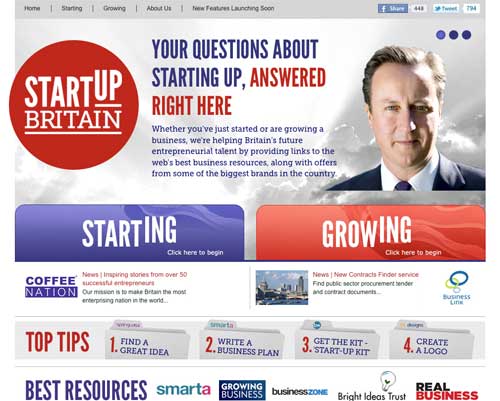A couple of potentially interesting launches today.
First came Start Up Britain, which offers an unusual proposition: ‘helping Britain’s future entrepreneurial talent by providing links to the web’s best business resources, along with offers from some of the biggest brands in the country’. You’re greeted at the top of the homepage, somewhat surprisingly, by a photo of David Cameron – looking quite sinister, or is it just me? (No, it’s not.)

The site claims to have ‘the full backing of the Prime Minister, the Chancellor and HM Government’, and the big photo of Cameron – which may or may not be connected to the adjacent proposition? – lends credibility to a one-page site which might otherwise come across as yet another attempt to make money from startups: of its four ‘top tips’, two are explicit adverts, and one expects the other two will lead to some monetisation further down the line.
Dig beneath the javascript, and there’s little more to it – for now at least – than a bunch of links and money-off vouchers: so in effect, it’s an online equivalent of the goodie bag you’d get at the door of any one of the many startup exhibitions. Steph said it was hammering nails into BusinessLink’s coffin: that seems premature. But it certainly poses some challenging questions of it.
Then this afternoon, we see the launch of Innovation Launch Pad, a Cabinet Office initiative powered by Spigit – whose recently appointed ‘general manager’ is James Gardner, who joined them from DWP at the start of the year.

Until 22 April, the Cabinet Office is inviting SMEs to ‘pitch business ideas on how you can help to provide better value for money in the delivery of Government’s business… The best ideas will be handpicked by a community of civil servants and, after intensive mentoring from some of Britain’s foremost entrepreneurs, those that demonstrate the highest impact will be invited to present their ideas at a Product Surgery in the summer. This will stimulate new, open competitions in Government markets in which these suppliers will be able to participate.’ None of which seems to guarantee any business, but anyway.
Coming on the same day, these two initiatives – both sitting somewhere between the public and private sector – certainly point to a different way of doing things, and (I suppose) make tangible Cameron’s notion of an enterprise-led recovery. Both are backed by names with good track records in this sort of thing, so certainly worth keeping an eye on. But do either of them fill me with inspiration? To be honest… no, not yet.
Response
To be honest, almost regardless of the effectiveness of StartUp Britain, I think it’s the nail in BusinessLink’s coffin. I can’t see how a £35m-a-year govt-funded website with relatively so little traffic will survive tough budget settlements once ministers sniff there is a Big Society alternative in the wings. And that’s leaving aside the excitement of a single domain for government 🙂
What’s interesting is how non-govt players respond to the Big Society opportunity. Traditionally, being associated with or supported by the Government has been a pretty unequivocally good thing. But as opinions of the Coalition polarise, and government is no longer a useful source of funding, I guess the question (and perhaps StartUp Britain’s mistake in not asking) is what benefit does association with ministers bring to this venture?
Sure, StartUp Britain has lots of voucher offers available elsewhere, so what. It links off to some suboptimal services, including US sites, which isn’t great. What it’s doing though is articulating another way of supporting business online which isn’t the godawful guides and tortuous decision trees of Business Link. There are definitely some missed tricks, notably the lack of much on-site community (powered by Smarta or BusinessZone say?) and the willingness to meekly link to the guidance stuff rather than demand it is released, then rewrite and improve it.
When I started a business, I found Business Link mainly useless, and the community sites of entrepreneurs much more interesting. Making business support a commercial proposition (like Smarta is, but more wideranging) makes a lot of sense, and I hope the founders stick with it, turn the site into a proper marketplace and community, and have the courage to tell government to get out of the way.